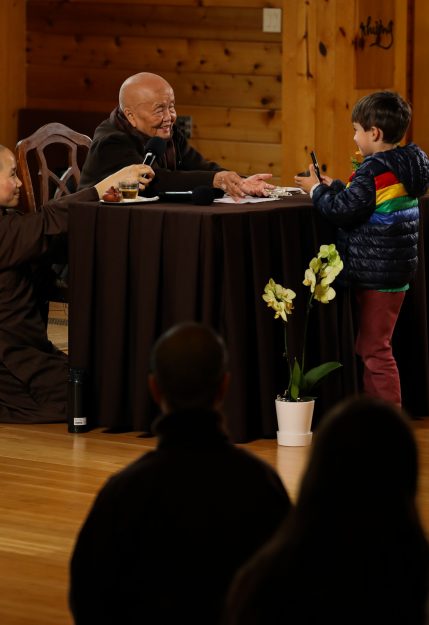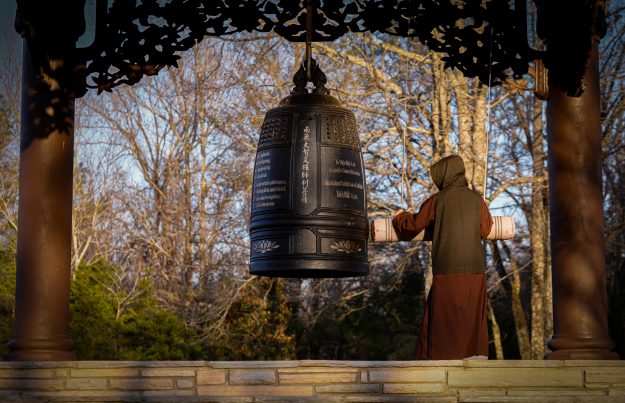YOUR CART
- No products in the cart.
Subtotal:
$0.00

Her lilting voice was powerful. The body may have been aging, and physical strength not what it once was, but the voice and the tack-sharp mind that it came from were constant. “You didn’t ask me about the Beloved Community. It’s important that we talk about that. It was what [Martin Luther King, Jr.] first dreamed of, and Thay picked up on the concept, and both worked so hard for this ideal.”
I turned my camera back on, adjusted the tripod, and continued the one-on-one interview I had been granted by Sr. Chan Khong, the Vietnamese peace activist, cofounder of the Plum Village Buddhist Monastery in southwest France, and, for all practical purposes, the person who is filling the vacuum since the physical death of Thich Nhat Hanh. I was in awe, and in some disbelief, that I had been given this wonderful opportunity to sit and visit with such a revered spiritual figure at Magnolia Grove Monastery in Batesville, Mississippi.
Sr. Chan Khong was the first fully ordained monastic of Thich Nhat Hanh and one of the original emissaries of engaged Buddhism. And here I was, a photographer from Texas and a relative newcomer to Zen Buddhism, about to interview the person one of the monastic brothers at Magnolia Grove had described as a “rock star.” Tupelo, Mississippi, may have given the world Elvis Presley, but the more than 300 individuals who attended the “Learning True Love” retreat in Batesville were eagerly awaiting their own star, and we would not be disappointed.
Sr. Chan Khong afforded retreat attendees compassionate insights on confronting their grief, mindfully working through daily difficulties, and utilizing spiritual tools to love themselves and others more authentically. She was present and visible, or, in other words, engaged. Sr. Chan Khong rendered her energy to all of us. Two mantras she repeated continually during the retreat were “flower fresh, mountain solid.” This was her exhortation to each of us: stay fresh, stay solid, immovable, and rooted. There was a pathway out of our suffering if only we dared to work through it nobly and mindfully.
She also showed us her rock star status quite literally on the several occasions she serenaded us with beautiful songs and chants in Vietnamese, French, and English, each a parable, a teaching, an insight by which we could walk our own paths in a more genuine way. Her strong, vibrant, and accordant voice would fill the Rising Tide Meditation Hall and dining area; it was as if an angel were singing to us. She seemed her happiest when she was able to offer us a lesson through song, and each of us was more than receptive to her enthusiastic performances.
Marie Dean, a volunteer at the retreat, was visiting from Chattanooga, Tennessee, and reflected on the impact the singing and chanting had on her during the deep relaxation sessions led by Sr. Chan Khong. “I didn’t always know what words she sang, but I knew what she was singing about. She was singing about her love for me and the community. During the deep relaxation exercises, she helped me drop my defenses. I felt like an infant being sung to sleep by her mother.” Caroline Felker, who lives in a closer proximity to Magnolia Grove, in Oxford, Mississippi, and has made numerous trips to the monastery, offered the following: “What a blessing to be in her presence, with her lively songs and funny stories. I felt so honored.”
The monastics—especially the younger nuns, who see her as a mother—were equally excited to welcome Sr. Chan Khong. Sr. Harmony, who has called Magnolia Grove home for the past six years, told me: “For me, Sr. Chan Khong is like a cool, clear stream, flowing free wherever it goes. That stream makes fresh grass, and trees cool themselves there. She has loved and helped people with an empty and boundless heart.” Sr. Boi Nghiem, a dharma teacher at Magnolia Grove Monastery, said, “Sr. Chan Khong is the representation and expression of true love. Her love to offer happiness and lessen the suffering of others is a reminder for me to live each moment meaningfully.”

True love was indeed palpable during the retreat, the enormity of Sr. Chan’s visit to a Buddhist monastery in northern Mississippi not lost on anyone. Visiting from Birmingham, Alabama, Chris Davis extended the following: “Her presence was strongly felt whenever she entered the meditation or dining halls. She was fully engaged with any individual she was having a conversation with. At 85, [she showed] no signs of slowing down.”
Before her reminder to me to visit the concept of the Beloved Community, Sr. Chan Khong addressed my questions, ranging from mindfulness in the West, the idea of interbeing taught more broadly, to what made her smile looking back at her life of service. She also left a message to the younger generation coming up behind us.
Mindfulness is growing steadily but slowly in the West, and more specifically, in the United States. Since Thich Nhat Hanh established his monasteries here, what has that meant for the teachings, and are you happy with the spread of mindfulness? Mindfulness is an aspiration. It is something that can help each of us suffer less and, in turn, help others to suffer less. I am glad to see the monasteries that we established here in the US continuing the teaching of mindfulness. There are so many things that can distract us from simply just being. Especially here in the US, complications arise, demands are trying to be met, and the individual often doesn’t seem to have time to just sit and be. So what our monastics are doing here is important and can help not just the person, but the person’s family. If we commit to engaging in mindfulness, slowly we see that transformation is happening everywhere, like a beautiful garden.
The world is tired of suffering, and certainly tired of more war, conflict, and violence. How can the message of interbeing be taught more broadly to provide hope? Touching the earth is touching others and ourselves. Seeing that each person is connected. This is what Thay taught me and the first monastics in Vietnam. If we are able to look deeply at another person’s suffering, if we become aware of them through loving speech, generosity, and giving, we can call this “true love.” This allows us to see others as ourself, and we will nurture the desire to see them dwelling peacefully in the present moment. When we are not suffering, we can see clearly, with true desire to help others not suffer. We can help take care of their pain. This is why interbeing must be taught more widely. But it must be taught with the desire to end suffering and being able to see us in each and every aspect of life.

Looking back at your journey through life, what has made you smile? What is one message you would like to give to others, especially youth? I have gained much joy from the interest in and spread of mindfulness, particularly from our earliest efforts. Not just here in the US and Canada, but also in Vietnam, France, and other parts of Asia. Mindfulness can help transform the person, which, in turn, can help transform the world.
As I spoke last night, I mentioned ‘flower fresh, mountain solid.’ There is a beautiful nature, but also a strong nature, to living in the present moment. When I visit the monastics at our monasteries and see them holding steadfast to these teachings, it brings me great happiness. My message, as you say, to younger generations coming up is simple: Touch the earth! Touching the earth is a beautiful act of true love. Be aware of our planet and be aware of others, and in this way we can help to alleviate great pain.
May we turn to the concept and teaching of the Beloved Community? What is it, and why is it important? Our teacher [Thich Nhat Hanh] admired Martin Luther King, Jr.’s vision of a Beloved Community. We were doing this as monastics; however, he called it a monastic practice of mindfulness. It was the same. It was the dream where all live ethically, no quarreling, a brother and sisterhood and understanding of each other. When we are doing this together, practicing together, we have a spiritual home. We are aware of each other, where we are and how we are. It is a rule or a guideline to live together in harmony. There must be respect for one another so we can build an even greater community.
♦
Photographer | Window to the World – The Photography of Jerome Cabeen | Beaumont
Follow Jerome Cabeen on Instagram: @jeromecabeenphotography